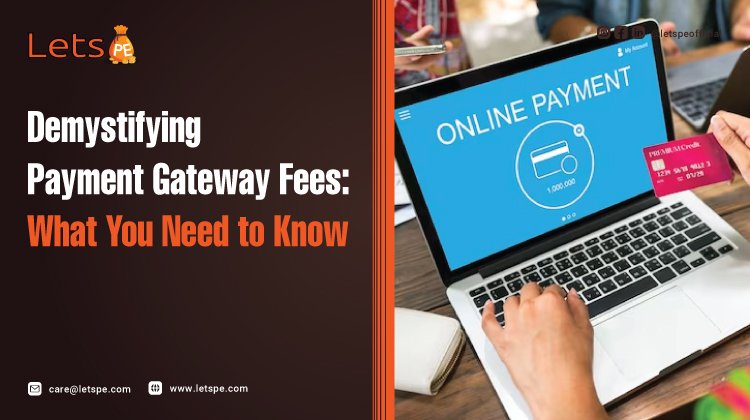Demystifying Payment Gateway Fees: What You Need to Know

In the fast-paced world of e-commerce, understanding the variation of payment processing is essential for businesses of all sizes. One factor that frequently confused both new and established entrepreneurs is the conception of payment gateway fees. In this article, we will dig deep into the world of payment gateway fees, demystifying their meaning, and slipping light on their significance in the online business geography.
Understanding Payment Gateways
Payment gateways are the virtual islands that grease the secure transfer of finances from a client’s bank account to the merchant’s account. Suppose of them as digital cashiers that ensure the smooth completion of online deals. Payment gateways play an important part in e-commerce by cracking sensitive data, authorising transactions, and eventually making online shopping possible.
The Purpose of Payment Gateway Fees
Payment gateway fees are the charges evaluated by service providers for the use of their payment processing solution. These fees cover a range of services, including transaction security, fraud forestallment, and client support. While they may feel like a fresh burden for businesses, they're integral to the flawless functioning of online payment systems.
Types of Payment Gateway Fees
Transaction Fees
Transaction fees are the most common type of payment gateway figure. They're generally a chance of the transaction value, plus a fixed amount. For example, a payment gateway in India may charge 3% + taxes of the transaction amount. This figure helps cover the costs of recycling each individual payment.
Monthly Fees
Some payment gateway providers charge a monthly subscription figure for their services. This figure can differ extensively and frequently depends on the position of service and features offered by the provider. Monthly fees can be a fixed cost or tied to transaction volume.
Setup Fees
Setup fees are one-time charges that businesses avoid when originally integrating a payment gateway into their website or software. Not all providers charge setup fees, but they can be a significant factor in the original cost of setting up an online payment system.
Interchange Fees
Interchange fees are a different aspect of payment processing and are generally charged by credit card companies like Visa and Mastercard. They're paid by the merchant’s bank to the cardholder’s bank for recycling credit card transactions. These charges aren't set by payment gateway providers but can impact the overall cost of payment processing.
Also read - Payment Gateway Service Provider in Gurgaon India
The Part of Acquiring Banks
Acquiring banks are financial institutions that work with merchants to enable credit card payments. They play an important role in negotiating interchange fees and processing deals. The choice of acquiring a bank can affect the overall cost structure of payment gateway fees for a business.
Factors Impacting Figure Structures
The fees charged by payment gateway providers can differ extensively, and several factors impact these structures.
Business Type
The type of business you manage can significantly impact the fees you pay. High-threat businesses, similar to those in the adult entertainment or gambling industry, frequently face advanced fees due to increased audit and implicit chargebacks.
Transaction Volume
Businesses recycling an advanced volume of transactions frequently qualify for lower fees. Payment gateway providers may offer volume reduction to drive larger merchants.
Industry Standards
The competitive geography of the payment processing assistance also plays a part in figure structures. Providers may acclimate their fees to remain competitive within their niche.
Comparing Payment Gateway Providers
When selecting a payment gateway provider, it’s important to compare not only their fee structures but also their features, security measures, and client support. It’s not just about changing the cheapest option but the one that best suits your business needs.
Tips for Reducing Payment Gateway Costs
Optimise Transaction Flow:- Streamlining the checkout process can minimise the number of abandoned wagons and lower sale costs.
Bargain Fees:- Don’t hesitate to bargain with your payment gateway provider, especially if your business is growing.
Examiner Fraud:- Implement robust fraud forestallment measures to minimise chargebacks and associated fees.
Consider Extra Payment Methods:- Some payment styles, like-wallets, may have lower fees than credit cards.
Regularly Review Your Provider:- As your business evolves, ensure that your payment gateway provider still offers competitive rates and services.
The Balance Between Fees and Services
While it’s natural to concentrate on minimising Payment Gateway fee Meaning, it’s conversely important to consider the value and services you admit in return. A slightly advanced figure might be justified if it comes with enhanced security features, dependable client support, and scalability options.
Hidden Fees What to Watch Out For
Guard of hidden fees that some payment gateway providers may not readily expose. These can include chargeback fees, cross-border transaction fees, and regard termination fees. It’s important to read the fine print of your agreement.
The Impact on Small Businesses
For small businesses and startups, Payment Gateway figure Meaning can be a significant expenditure. It’s important to select a provider that offers transparent pricing and scalability options to grow with your business.
Conclusion
Payment gateway fees are an integral part of online commerce, enabling businesses to securely accept payments from clients worldwide. While they may feel complex, understanding the numerous types of fees and factors impacting their structures can empower businesses to make informed opinions when selecting a payment gateway provider.












